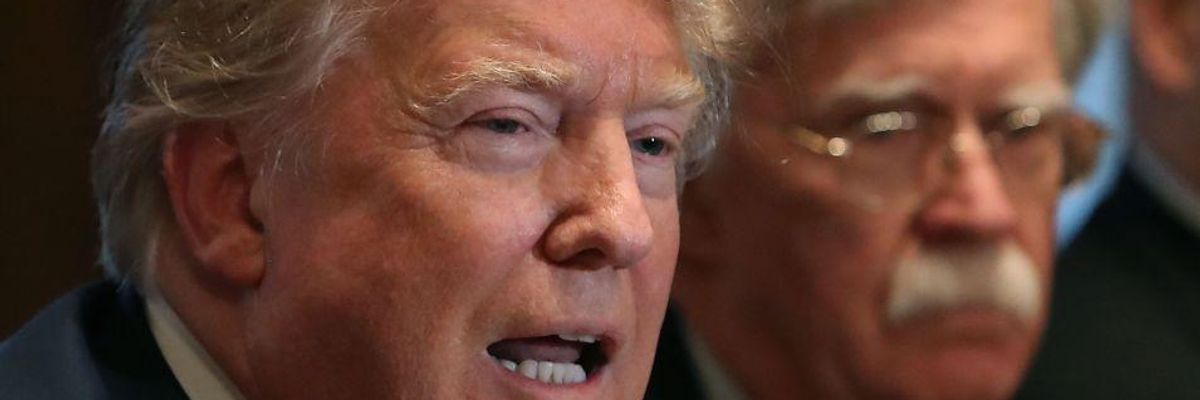

SUBSCRIBE TO OUR FREE NEWSLETTER
Daily news & progressive opinion—funded by the people, not the corporations—delivered straight to your inbox.
5
#000000
#FFFFFF
To donate by check, phone, or other method, see our More Ways to Give page.


Daily news & progressive opinion—funded by the people, not the corporations—delivered straight to your inbox.

U.S. President Donald Trump is flanked by National Security Advisor John Bolton as he speaks about the FBI raid at his lawyer Michael Cohen's office, while receiving a briefing from senior military leaders regarding Syria, in the Cabinet Room, on April 9, 2018 in Washington, DC. The FBI raided the office of Michael Cohen on Monday as part of the ongoing investigation into the president's administration. (Photo: Mark Wilson/Getty Images)
My take on the recent U.S. strike (in concert with a few European lackeys) on Syria is that it was carefully choreographed political theater where everyone performed to perfection the roles assigned them by Washington. The supporting actors understood they had no choice but to watch the U.S. finesse its way out of a sticky situation.
Finally, the United States operates from the following sense of unmitigated hubris: "Because we own the world we do whatever we choose. So, do as we say, or else." Given a rising China and a resurgent Russia, this exaggerated sense of omnipotence may be the empire's undoing. We would be well advised to prevent our rulers from taking us and the rest of the world down with them.
Dear Common Dreams reader, The U.S. is on a fast track to authoritarianism like nothing I've ever seen. Meanwhile, corporate news outlets are utterly capitulating to Trump, twisting their coverage to avoid drawing his ire while lining up to stuff cash in his pockets. That's why I believe that Common Dreams is doing the best and most consequential reporting that we've ever done. Our small but mighty team is a progressive reporting powerhouse, covering the news every day that the corporate media never will. Our mission has always been simple: To inform. To inspire. And to ignite change for the common good. Now here's the key piece that I want all our readers to understand: None of this would be possible without your financial support. That's not just some fundraising cliche. It's the absolute and literal truth. We don't accept corporate advertising and never will. We don't have a paywall because we don't think people should be blocked from critical news based on their ability to pay. Everything we do is funded by the donations of readers like you. Will you donate now to help power the nonprofit, independent reporting of Common Dreams? Thank you for being a vital member of our community. Together, we can keep independent journalism alive when it’s needed most. - Craig Brown, Co-founder |
My take on the recent U.S. strike (in concert with a few European lackeys) on Syria is that it was carefully choreographed political theater where everyone performed to perfection the roles assigned them by Washington. The supporting actors understood they had no choice but to watch the U.S. finesse its way out of a sticky situation.
Finally, the United States operates from the following sense of unmitigated hubris: "Because we own the world we do whatever we choose. So, do as we say, or else." Given a rising China and a resurgent Russia, this exaggerated sense of omnipotence may be the empire's undoing. We would be well advised to prevent our rulers from taking us and the rest of the world down with them.
My take on the recent U.S. strike (in concert with a few European lackeys) on Syria is that it was carefully choreographed political theater where everyone performed to perfection the roles assigned them by Washington. The supporting actors understood they had no choice but to watch the U.S. finesse its way out of a sticky situation.
Finally, the United States operates from the following sense of unmitigated hubris: "Because we own the world we do whatever we choose. So, do as we say, or else." Given a rising China and a resurgent Russia, this exaggerated sense of omnipotence may be the empire's undoing. We would be well advised to prevent our rulers from taking us and the rest of the world down with them.